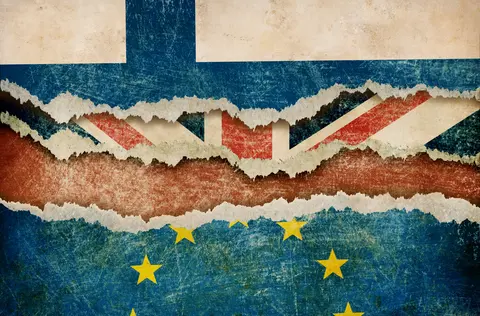
The Rotterdam effect
The Rotterdam effect

The Rotterdam effect (also known as the Rotterdam-Antwerp effect) refers to errors in the way trade is calculated when trade flows through ports on their way to final destinations outside of the country or trading block. In the case of Rotterdam and Antwerp, a large proportion of goods are simply unloaded from one ship and reloaded onto another in a relatively short space of time.
EU vs non-EU trade
While not inflating total trade flows, the Rotterdam effect will distort the breakdown between one country’s trade with the EU and with non-EU countries. Interest in the Rotterdam effect has increased recently as a result of the Brexit debate about the relative importance to the UK of trade with the EU and non-EU countries. As an illustration, if an African country (X) exports corn oil to the UK, it is likely that it will pass through Rotterdam, on its way to the UK. If this is recorded as a flow from country X to the EU, and then from the EU to the UK, it will have the effect of over-valuing EU trade with the UK, and undervaluing non-EU trade with the UK. While this distortionary effect would arise from trade through any EU port, Rotterdam is a particularly significant port, especially in terms of trade in oil and other commodities. The UK (and other oil exporters) ship large quantities of crude oil to the Netherlands to take advantage of its oil refining capacity, but the refined oil ends up in a variety of countries, many of which are not in the EU.
Measuring trade flows
More widely, the Rotterdam effect can lead economists to question how trade statistics are gathered and analysed. Most national statistical authorities have at least two ways of processing statistics, based on accepted international standards. These are the ‘country of origin’ basis, and the ‘country of dispatch’ basis. Even the country of origin basis is not necessarily all it seems in that the country of origin is defined as the country where the ‘last substantial processing’ took place. It is inconsequential how trade flows are recorded regarding goods or materials which move from one non-EU country to another and then on to the UK, as this would not influence the EU vs non-EU breakdown. For example, maize grown and harvested in Ghana, but processed into manufactured food products in Nigeria, and then exported to the UK will all be classified as non-EU trade. However, when crude oil is part-processed in the Middle East, and shipped to the Netherlands for more refining, and then exported to the UK, it is less easy to apportion accurate values on the contribution of non-EU and EU countries in terms of imports to the UK. In practice, for the UK (as with other EU countries) statistics on imports from no-EU countries are available in terms of a ‘country of origin’ basis, but imports from the EU are recorded on a country of dispatch basis.
The UK statistical authorities have attempted to estimate the significance of the distortion caused by the Rotterdam effect. It has analysed the effect by making two assumptions. The first extreme assumption, which can be applied to the UK, is that all exports to the Netherlands are re-exported to non-EU countries and all imports from the Netherlands have their origin outside the EU. If this is the case, then the HMRC estimates that the actual value of UK trade with the EU is 8% lower than official figures suggest (and UK trade with the non-EU world is 8% more than is currently officially stated.) If true, it tends to strengthen the argument that the EU is less significant to the UK than officially recognised. However, it is clear that a proportion of UK trade is directly with the Netherlands. Hence, the HMRCs second assumption is that only 50% of UK trade with the Netherlands is related to non-EU countries. Although they made no claim for overall effect of this, we could argue that this means that the 8% distortion could be halved.
Trade with the EU with and without the NetherlandsSource: National Archiveswww.economicsonline.co.uk19981999200020012002200320042005200620072008200920102011201220136080100120140160180200220240£billionsExports to EU Exports to EU (exc Netherlands) Imports from EU (exc Netherlands) Imports from EU
There has also been another approach to establishing whether a Rotterdam effect exists. This method looks at trade values per head of similarly developed economies, with the assumption that these per capita trade values should, for countries at the same level of development, be very similar. On this basis, trade with the Netherlands on a per-capita basis is significant higher that other EU countries, which again confirms that a Rotterdam effect does indeed exist. However, it appears that few analysts are prepared to stand up and declare what they regard the effect is.
See also:
Additional sources, other than those with links:


